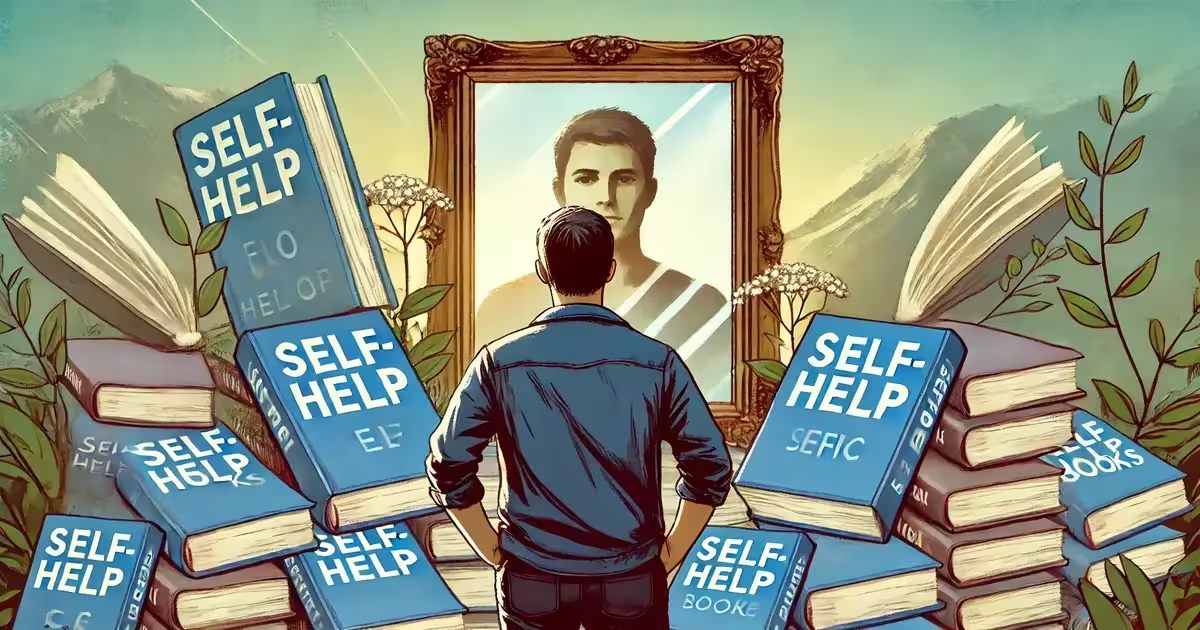Inside the Toxic World of Self-Help: Exposing the Deceptive Practices

Ever found yourself pulled into the toxic world of self-help? It’s tempting, promises of overnight change, instant confidence, and a better life seem just one book or podcast away.
I remember how quickly it started for me. A friend recommended a bestselling self-help book, and soon I was hooked. I binged through seminars, podcasts, and every so-called “expert” I could find, hoping for that magic breakthrough.
But the deeper I went, the more I realized: not everything in the self-help industry is healthy. Behind the promises, there’s a side that’s anything but uplifting.
Curious what really goes on in the toxic world of self-help? Let’s pull back the curtain and see what’s hidden beneath the hype.
Overview:
The self-help industry promises quick fixes, but it often preys on insecurities and can trap people in endless cycles of “improvement” without real results. Real growth comes from practical action, honest reflection, and seeking professional help when needed, not just consuming more advice. Stay curious, but trust yourself first.
Picture this. You’re feeling stuck or lost, and along comes the self-help industry with its shiny promises and simple solutions. It feels like someone’s finally throwing you a lifeline.
Finally, a way out of the fog, right? But behind all those glossy covers and charismatic speakers, there’s a whole industry built on selling hope. Sometimes, that hope is genuine.
Sometimes, it’s just a distraction that keeps you chasing the next fix, leaving you even more confused than before.
That’s what I want to unpack here. I’ll share some personal lessons, dig into how self-help rose to power, point out the red flags, and call out some common myths. The goal? Let’s figure out how to improve our lives, without falling into the usual traps.
The Rise of Self-Help
Self-help has ancient roots. Back then, philosophers handed out advice on living well, but nothing like what we see now. Fast forward: a book like How to Win Friends and Influence People catapults the whole genre into the mainstream.
I recall the excitement I felt when I first picked up self-help books. The idea that I could become a new version of myself was addictive.
At first, I thought every book would unlock a new level. Each promised the secret sauce to a better life. But after a while, I noticed a pattern.
Most of these books sounded smart, but often lacked substance. It felt like I was on a hamster wheel, lots of motion, not much progress.
Why? The self-help business works by tapping into our insecurities. It’s a huge market, packed with programs all promising transformation. But let’s be honest, a lot of it is just recycled ideas, dressed up with new buzzwords to keep you buying.
Chasing these quick fixes can give you a sense of accomplishment, but deep down, nothing really changes.
So what’s actually toxic about self-help? Let’s break it down.

What Makes Toxic World of Self-Help?
First, there are the scams. Some programs and seminars charge insane prices for results they can’t deliver. I’ve wasted my share of money on them, chasing that next motivational hit, only to realize it was just empty hype.
Then there’s toxic positivity. This is the relentless “good vibes only” approach, where every negative feeling is painted as bad. Sure, positive thinking matters, but ignoring your pain doesn’t heal it.
If anything, it pushes those feelings deeper, where they quietly mess with you even more.
Another problem? Self-help addiction. It’s easy to binge motivational content and convince yourself you’re making progress. But if you’re only reading or listening, and never changing your behavior, you’re not moving forward.
You’re just “action faking”, going through the motions without real results. I’ve been there. You feel busy, but you’re stuck.
Let’s not forget about the books themselves. Some are written by people with no real expertise, just a knack for telling a good story. They cherry-pick studies, stretch the truth, and bank on readers not digging too deep.
And then you have the self-help “cults,” led by charismatic leaders who claim to have all the answers. These groups discourage questioning, demand loyalty, and sometimes even shame you for doubting them. Suddenly, you’re following someone else’s script for your life.
Seeing these warning signs is step one. Next, let’s look at why so many people criticize the self-help world, and why some criticism is well deserved.

Why So Much Criticism?
Let’s get real. The self-help industry has almost no regulation. Anyone can call themselves a guru, write a book, or launch an online course. There’s no one making sure their advice works.
This opens the door for profit-driven players who care more about their bottom line than your wellbeing.
One of the biggest problems? Toxic self-help often exploits fear and feelings of not being good enough. The more insecure you feel, the more likely you are to buy the next book, sign up for the next workshop, and keep chasing a fix. This creates a cycle of dependency, not empowerment.
You’ll hear plenty of stories about people spending thousands on programs, only to feel worse afterward. I’ve had clients come to me after burning out on the self-help hamster wheel, feeling even more hopeless than when they started.
Self-help isn’t a substitute for real therapy or mental health support. Struggling with depression, anxiety, or trauma? Books and podcasts might help a little, but they’re not going to replace professional guidance.
Yet, some “experts” will tell you to trust only their method. That’s not just bad advice, it can be dangerous.
All this means we need to approach self-help with eyes wide open. Let’s tackle a few common myths that keep people stuck.
$10 Billion
$12 Billion
45% Spent
71% Spent
60% Trust
40% Skeptical
Self-Help Myths That Need Busting
First up: You don’t need to read every self-help book under the sun to improve your life. Honestly, most repeat the same advice. Find a few good ones that resonate and put those ideas into action.
Second: Gurus don’t have all the answers. Many are just great marketers, not great mentors. It’s worth asking, does their advice stand up in real life, or just in their sales pitch?
And let’s talk about “toxic positivity” again. The myth suggests that you should be positive all the time. The truth? Real growth means dealing with the hard stuff, not just plastering on a smile.
Hard work alone guarantees success. Not really. Hustle culture will tell you to grind endlessly, but burnout is real. Smart, sustainable effort matters more than non-stop work.

How To Use Self-Help Without Getting Burned
Here’s how to keep your sanity (and your wallet) intact:
Reflect as you go. Ask yourself, what’s working? What’s just spinning your wheels? This regular check-in keeps you honest and moving in the right direction.
Subscribe to Create Higher Vibrations!
Get Inspiration and Practical advice straight to your inbox.
Final Thoughts
Self-help can help, or hurt. It all depends on how you use it. There are powerful tools and genuine insights out there, but also a minefield of scams and empty promises. The more aware you are, the better you’ll be at spotting the difference.
Self-help is just one resource. True growth needs a balanced mix, practical steps, professional support when needed, and the courage to face both good and bad feelings.
So, as you keep working on yourself, stay sharp, stay curious, and, above all, stay true to what feels right for you. Thanks for coming along for this honest look at the self-help world. Hope it’s given you something real to think about.


